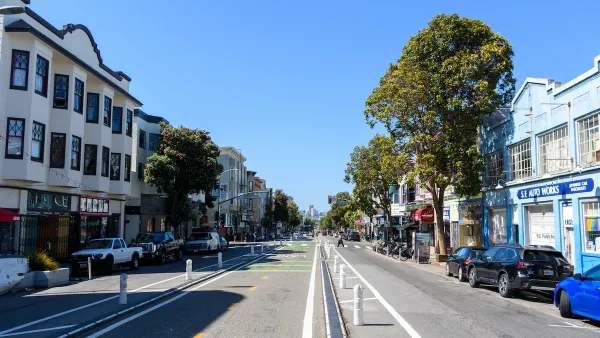Rachel Gordon reports on San Francisco's "aggressive plan to install thousands more parking meters and to expand the hours they operate," which has drivers fuming.
By targeting its parking policies "to encourage travel by public transit and sustainable modes of transportation," as outlined in a new San Francisco Municipal Transportation Agency document mapping out the city's parking management strategy, planners and officials are upholding the city's transit-first policy that has been in place for nearly four decades and reaffirmed by voters in 1999, 2007 and 2010. But this hasn't stopped the city's automobile users from speaking out. According to Gordon, "Some drivers in the city feel unfairly targeted and protective of the dwindling perks they have left."
"'People are really ready to fight back. The city is just going too far,' said Mari Eliza, who lives and works in the northeast Mission and is an organizer with the advocacy group ENUF, Eastern Neighborhoods United Front, that helped persuade the city to slow down the planned implementation of new meters in their area."
"She said taking transit, biking and walking is not for everyone. She, for one, doesn't feel safe taking Muni or BART at night," notes Gordon.
"Jay Primus, who runs the city's SFpark program, agrees that alternatives to driving are not an option for all. 'Transit first is not anticar,' he said."
"He noted that the city is working to find a better balance so drivers, cyclists and pedestrians can benefit. But he also argues that the parking program that manages availability by demand-based pricing helps reduce the amount of time drivers circle a block looking for a space, reducing congestion, greenhouse-gas emissions and frustration behind the wheel."
The parking management strategy is scheduled to be considered by the Transportation Agency's governing board on Sept. 18.
FULL STORY: SF parking plan's message: Transit first

National Parks Layoffs Will Cause Communities to Lose Billions
Thousands of essential park workers were laid off this week, just before the busy spring break season.

Retro-silient?: America’s First “Eco-burb,” The Woodlands Turns 50
A master-planned community north of Houston offers lessons on green infrastructure and resilient design, but falls short of its founder’s lofty affordability and walkability goals.

Delivering for America Plan Will Downgrade Mail Service in at Least 49.5 Percent of Zip Codes
Republican and Democrat lawmakers criticize the plan for its disproportionate negative impact on rural communities.

Test News Post 1
This is a summary

Test News Headline 46
Test for the image on the front page.

Balancing Bombs and Butterflies: How the National Guard Protects a Rare Species
The National Guard at Fort Indiantown Gap uses GIS technology and land management strategies to balance military training with conservation efforts, ensuring the survival of the rare eastern regal fritillary butterfly.
Urban Design for Planners 1: Software Tools
This six-course series explores essential urban design concepts using open source software and equips planners with the tools they need to participate fully in the urban design process.
Planning for Universal Design
Learn the tools for implementing Universal Design in planning regulations.
EMC Planning Group, Inc.
Planetizen
Planetizen
Mpact (formerly Rail~Volution)
Great Falls Development Authority, Inc.
HUDs Office of Policy Development and Research
NYU Wagner Graduate School of Public Service



























